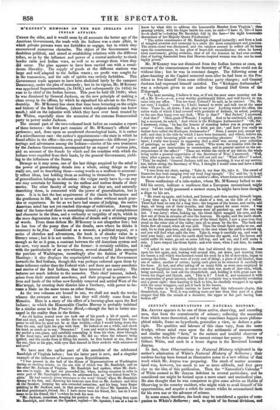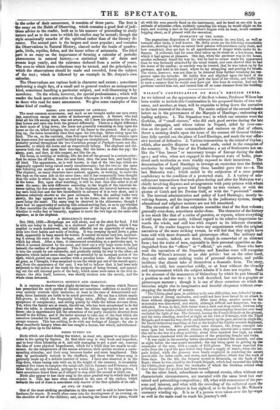JENYNS'S OBSERVATIONS IN NATURAL HISTORY. MR. JENYNS appears to be
one of those active, observing, and recording men, that form the commissariat of science; collecting the materials from which more theoretical, and it may sometimes happen more philoso- phical minds, frame an hypothesis, generalize a view, or deduce a prin- ciple. The qualities and labours of this class vary, from the mere drudge, whose mind runs upon the dry arithmetic of measurements and similar tangible " facts," to the earnest and truthful observer of nature, who feels her charms if he cannot extract her poetry. Such was Gilbert White, and such in a lesser degree is the Reverend Leonard Jenyns. In fact, these Observations in Natural History originated in the author's admiration of White's Natural History of Selborne ; thek nucleus having been formed as illustrative notes to a new edition of that work which Mr. Jenyns was preparing. The stock of matter accumu- lated was, however, too much to use as mere addenda, and first gave rise to the idea of this publication. Then the "Naturalist's Calendar" of White seemed to Mr. Jenyns deficient in several particulars, and he considered one might be formed upon a more exact and methodical plan. Ile also thought that he was competent to give some advice on Habits of Observing to the country resident, who might wish to avail himself of his opportunities, and acquire a relish for nature whilst he accumulated fact for his own use or the advance of science.
In some sense, therefore, the book may be considered a species of com- panion to White's Selborne ; and, to speak of its formal division's, and
in the order of their occurrence, it consists of three parts. The first is the essay on the Habit of Observing, which contains a good deal of judi- cious advice to the reader, both as to his manner of proceeding to study nature and as to the uses to which his studies may be turned; though the style occasionally smacks of the spiritual rather than of the literary di- rector. The second part is the largest and most popular; and contains the Observations in Natural History, classed under the heads of quadru- peds, birds, reptiles, fishes, and the lesser tribes of animantia. The third part is an essay on the importance of forming a calendar of periodic phtenomena in natural history,—a statistical table of dates and events kept yearly, and the extremes deduced from a series of years. The uses to which these collections may be turned, and the principles on which the observations should be made and recorded, form the subject of the text ; which is followed by an example in Mr. Jenyns's own calendar.
The Observations are various both in character and extent ; sometimes embracing a single fact, of a small and to general readers an unimportant kind, sometimes handling a particular subject, and well illustrating it by anecdotes. On the whole, however, the special predominates ; which will render the book more attractive to those who open it with a purpose than to those who read for mere amusement. We give some examples of this latter kind of reading.
RISING AND MOVEMIOCT OF ANIMALS.
The most common occurrences, and such as are brought under our eyes every day, sometimes escape the notice of inobservant persons. A farmer, who had lived all his life among stock, was not aware, till I drew his attention to the fact, that horses and oxen rise from the ground differently. There is a slight difference in their mode of lying down; the horse not generally remaining so long upon his knees as the ox, before bringing the rest of Ins frame to the ground. But in get- ting up, the horse invariably rises first upon his fore-legs, before rising upon his hind. The ox, on the contrary, rises first upon the hind, and often remains upon his knees some few seconds until his hind-legs are straightened. These differences probably prevail throughout the two Cuvierian groups of Pachydernsata and Rs- =assists, to which the horse and ox respectively belong. The elephant and rhi- noceros both rise first upon their fore-legs, like the horse; so does the pig: the sheep,goat, and deer, in this respect, are like the ox. The horse, in trotting or walking, lifts his feet off the ground in a certain order: first he raises the off fore, then the near hind, then the near fore, and lastly the off hind. The appearance, as is well known, is that of the two legs which are diagonally opposite being raised nearly simultaneously; but the two on the same side following one another at a moderate interval, the hind one advancing first. The elephant, as many observers have noticed, appears, in walking, to move the two legs on the same side at the same time; and it has occasionally been thought that the order in which the legs are raised from the ground is different from that in the horse. But, upon close watching, it will be seen that this order is in all eases the same; the only difference consisting in the length of the intervals be- tween taking the feet successively up. In the elephant, the interval between rais- ing each hind-foot and the fore immediately in advance of it is very short, and it becomes relatively shorter as the pace increases. When the animal walks very slowly, the legs appear to move just as in the horse; the interval in the two cases being the same. The same may be observed in the rhinoceros; though I have had no opportunity of noticing this animal moving fast, so as to say whether it then resembles the elephant in the appearance of the legs or not. The giraffe, whether it walks fast or leisurely, appears to move the two legs on the same side nether, as in the elephant.
A HEDGEHOG'S REPAST.
Oct.. 28th, 1828.—Hedgehogs are still about, and on the alert for food. I fell in with one today in my walks, in a sheltered part of the garden which I was enabled to watch unobserved, and which afforded me an opportnity of seeing a little into their habits and mode of feeding. It was creeping up and down a grass walk, apparently in busy search for worms. It carried its snout very low, insinuat- ing it among the roots of the herbage, and snuffing about under the dead leaves which lay about. After a time, it commenced scratching at a particular spot, to which it seemed directed by the scent, and drew oat a very large worm from just beneath the surface of the ground. This it immediately began to devour, taking it into the mouth by one extremity, and gradually eating its way to the other; an operation which lasted some time, and was attended by an incessant action of the teeth, which grated one upon another with a peculiar noise. After the worm was all gone, as I thought, I was surprised to see the whole put out of the mouth again; and, from the appearance of the cast, I was led to believe that it had been only subjected to the action of the teeth for the purpose of being braised, and squeez- ing out the soft internal parts of the body, which alone were eaten in the first in- stance: the skin itself, -however, was shortly retaken into the mouth, and the whole clean devoured.
MATERNAL INSTINCT AND JEALOUSY.
It is curious to observe what slight deviations from the course which Nature has prescribed for each species of animal are sometimes sufficient to modify and even entirely overrule their instincts; at least in the case of domesticated ani- mals, these instincts are liable to be much perverted. My cat has a kitten nearly fall-grown, to which she frequently brings mice, offering them with evident symptoms of complacency, and sitting quietly by while the kitten devours them. Yet, when the family are at meals, the old cat, who has been accustomed to be fed from the table, is exceedingly jealous when the kitten approaches her at such times: she is apprehensive lest the attentions of the party should be diverted from herself to the kitten; and if the latter attempt to take any of the food which she conceives intended for herself, she growls, and flies at her offspring in the most savage manner. This has nothing to do with any feelings of hunger; for she is often manifestly hungry when she has caught a mouse, but which, notwithstand- ing, she gives up to the kitten.
BIRDS TUNING UP.
Birds which are silent daring the winter, as most are, appear to acquire their notes in the spring by degrees. At first their song is very weak and imperfect; and to hear them labouring at it, and only managing to get a part out, conveys the idea of some physical Impediment, which for a while they are unable to sur- mount. As the temperature of the season advances, their system receives a corre- sponding stimulus, and their song becomes louder and more lengthened. This may be particularly noticed in the chaffinch, and those birds whose song is generally made up of a definite number of notes. I have also observed it in the ring-dove, whose cooing note with us, in the height of the summer, is invariably repeated five times to complete the usual call; but in January and February, when these birds are only induced, perhaps by a mild day, just to try their powers, I have sometimes heard them as if obliged to stop after the second or third coo.
Birds also appear to lose their song in the same gradual way in which they first acquire it. This has been often remarked in the case of the cuckoo, which towards the end of June is sometimes only master of the first syllable of its call.
AN OWL OF TASTE.
One of the most striking peculiarities in this tame owl is said to have been its fondness for music. It would often come into the drawingroom of an evening, on the shoulder of one of the children; and, on hearing the tones of the piano, would sit with his eyes gravely fixed on the instrument, and its head on one side in an attitude of attention; when, suddenly spreading his wings, he would alight on the keys, and making a dart at the performers fingers with its beak, would continue hopping about, as if pleased with the execution.
PUGNACITY OF THE ROBIN.
The pugnacious disposition of the redbreast towards its own kind, as well as towards other birds, is well known. Mr. Selby sends me the following remarkable anecdote, showing to what an extent their passion will sometimes carry them, and how completely they are lost to all apprehensions of danger while under its in- fluence. A redbreast had for some time taken up its abode in a hot-house, from which it bad egress at pleasure. One day, when the gardener was in the home, another redbreast four his way in; but he had no sooner made his appearance than he was furiously attacked by the usual tenant, and soon showed that he had the worst of the combat: so severely was he treated, that he was taken up by the euer, and held in his hand, where he lay struggling and panting for breath. �Thhe victor, however, was not thus to be deterred from further wreaking his ven- geance upon the intruder. He boldly flew and alighted upon the hand of the gardener; and forthwith proceeded to peck the head of his victim, and buffet him in such a manner that he would soon have put him hors de combat, had not the gardener carried him out, and turned him off at some distance from the building.



























 Previous page
Previous page